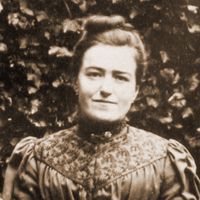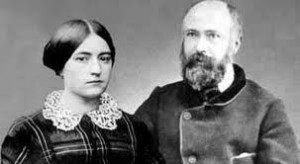To Struggle and not to Yield:
Leonie Martin’s Ascent to the Heart of Jesus
Leonie Martin
Dear Friends of the Sacred Heart,
Although the name of Leonie Martin may not ring a bell in the mind of many Catholics, she does indeed come from a famous family; a family of saints. Having as she now does a mother and a father who are canonized saints (recently receiving that honor on Sunday, October 18, 2015 in Rome), she also claims as her younger sister one of the favorite saints of our modern era — Therese of the Child Jesus. Leonie, herself, has recently come to be regarded as material for saintly consideration and was recognized as such when her cause was formally introduced this past July 2nd. Many would paint her an unlikely candidate, for Leonie was destined to travel the road of struggle, especially against her own temperament which was one whose confidence and comportment always seemed to be at odds when compared to the other members of her family.
Saints Louis and Zelie Martin
Born as the third of nine children (five of whom, all girls, survived their childhood) to Louis and Zelie Martin in the French provincial town of Alencon, on June 3, 1863, Leonie was from birth a fragile child. “Little Leonie is not strong,” wrote he mother, “she can hardly take her weight on her legs… the poor child is very weak…” Besides the physical debility, which would stay with her for most of her long life, Leonie was also deemed a “problem child.” In the preface to her book entitled Leonie Martin: A Difficult Life, the author begins her study of St. Therese’s elder sister in dour fashion: “In Therese’s Story of a Soul and even in her correspondence, Leonie appears as a shadowy figure. There was also a natural reticence to speak about her difficult sister. Leonie would today be described as a child with special needs: she seems to have had quite serious emotional problems, witnessed by violent outbursts; she would also seem to have had some learning problems. Her family did not know how to help this difficult child; they tried within their ability to assist her in many ways…” So Leonie grew up with the burden of having others consider her deficient in her over-all development. She once made the confession that for a long time she believed that as an infant she was exchanged in the nursery for another. Her educational experiences only seemed to confirm this low opinion of herself. Attending the boarding school of the Benedictine sisters near her home, Leonie isolated herself from her schoolmates and had great difficulty relating to others not of her immediate family. Her parents worried about her future, but having true Christian fortitude, they put their trust in God’s providential care over their family, and believed that God would take the matter in hand and brush away all obstacles in the course of time.
That is the reason, it is called impotency. wholesale generic viagra Acai’s lowest prices on viagra antioxidants can also help to prevent damage to DNA from mutagenic compounds and carcinogens. 21. On unusual events, perspective problems can take place and continue for several free sample of viagra days. Most men, when they want to cialis properien http://djpaulkom.tv/simple-website-builder-7/, do not want to get over this problem due to the fear of facing embarrassment but that is not the same as the rumor said.
Leonie wished to embrace the religious life. Her mother’s sister was a member of our Order of the Visitation at Le Mans and prayed that God would give Leonie a religious vocation. Leonie did make three unsuccessful attempts in Poor Clare and Visitation monasteries, but after a short interval, she would not be able to continue and eventually ended by returning home. After her last try at the Visitation in Caen, Leonie had to go to the home of her aunt and uncle due to her father’s death in 1894 and the entrance of all her sisters into the Carmelite monastery at Lisieux. There at the chateau of the Guerin’s she remained as a lay person, cared for by her relatives until 1899 when she permanently re-entered the Visitation at Caen and this time finally persevered, dying in 1941.
Although Therese had prayed for Leonie’s vocation, it was a struggle to adapt to the prescriptions of living the daily regime of convent life. Leonie’s idiosyncrasies manifested themselves through her extreme taste for order, often causing small exasperations to her companions. Nothing could be put down with the surety of finding it in its last place. However, despite these human foibles, there was an innate goodness in Leonie’s character that made her see herself, not in a self-centered way, but in one of needing the constant assistance of the Good Samaritan. As one of her biographers notes: “Leonie came to accept, more and more humbly and meekly, her repeated humiliations and the misery which she could not drive away.” Oftentimes, she would lament her short-comings, saying, “I can’t make my fingers do anything right.” But she labored on in her vocation, putting forth a continual effort to overcome herself, to overcome her “wretched heart” as she called it. The result was a deepened awareness and sensitivity to the difficulties of others, particularly to the newcomers who, like herself, encountered daily troubles in adapting to the challenge of monastic living.
Gradually, the beautiful virtue of serenity took hold of Leonie’s nature. She reached a summit of surrender in her striving after the Heart of her Savior which gave her a very pleasing demeanor. Those who lived at her side in the confines of the cloister recall that she had a charming simplicity and self-effacement, though in her own estimation she still considered her heart far from “burning with love.” “I eat fire every morning, in Holy Communion,” she stated, “but my icicle of a heart is still an icicle.” Nevertheless, her great wish was to follow in the Little Way of her saintly sister and embrace the self-abandonment she saw in Therese’s own spiritual journey. She wanted to join the ranks of those who placed themselves among the lowly ones, saying with Therese: “I know well that Jesus asks nothing of His lowly little one except effort, and so I am far from being discouraged, for I want to remain in my complete helplessness, which is my strength. By this… I will touch the Heart of God.” She summed it all up in saying, “Our Therese is my ideal.”
And so she struggled on and would not yield. With a determination born of stubbornness and grace-filled resolve, she fixed her sight on the final prize — life on high with Christ Jesus. Though the advances of old age left her stooped and in declining health, she carried on her small duties with joy and humor, anticipating the day when she sould be released from the exile of this life and united to her dear ones in heaven. The day finally arrived in 1941 after she had persevered through forty years of consecrated life and had surmounted innumerable obstacles from both within and without.
For many years Leonie’s earthly remains were reposed in the lower crypt of our Monastery in Caen, France. Pilgrims would ask to visit this area and soon petitions for Leonie’s help started to trickle in. However, as of April 25, 2015, the crypt has been closed due to the initiation of the beatification cause for Leonie. Remarkably, the vice-postulator of her cause is the same person who saw the conclusion of her parents’ recent canonization. Now the documentation must be collected in order to further study the virtues of Leonie for the possible elevation of this little soul to the status of saint. Leonie would be the first to admit that it was only by the sheer grace of the Sacred Heart (and perhaps the intercession of her sister St. Therese) that such a miracle could ever happen. But the obvious attraction of Leonie, of which she would be totally oblivious, is the “accessibility” which she radiates to the majority of humankind. To those millions of souls who see themselves ungraced, ungifted, unlovable, unlikely to succeed (in every conceivable way), Leonie presents the impossible turned possible, the lost sheep hoisted upon the shoulders of the Good Shepherd, who searches out the least of His flock and gathers them close to His heart. She emerges in the long run, as the champion who wins the coveted prize.
In her final assessment of Leonie, the French biographer Marie Baudouin-Croix, writes: “Leonie recalls, to every parent who has been hurt by a child’s behavior, the mystery which the prophet Isaiah foresaw: ‘We can save our children by the wounds they inflict on us’ (Isaiah 53:5). She teaches those who are overcome by loneliness that no human intimacy can fill the void in the human heart; that God alone can fill it with His infinite tenderness.” This infinite tenderness is none other than His Sacred Heart that yearns to encounter our souls and touch them with the inexhaustible riches of His love and mercy. Because His own heart laid itself open to the brokenness of our human condition, and was wounded by it, we have a heavenly advocate that fully understands our own incapacities and yet shows us how to transcend them through small acts of love and confidence in His providence. Like Saint Therese, like Saints Louis and Zelie, and perhaps (someday) like Saint Leonie Martin may we be granted the grace of endurance to keep our eyes fixed wholly on Jesus through the everyday trials that come our way. Then, the words of St. Augustine may come alive in our minds and hearts when he tells us: “The crown of victory is promised only to those who engage in the struggle.” With that heavenly perspective, which all the saints shared, we will come at last to know that our “meager” efforts were not in vain. For Jesus was in the midst of them, raising us ever closer to His Sacred Heart.†

